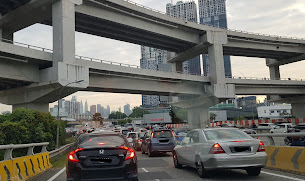It has been one week since I reported duty in my new workplace - Universiti Putra Malaysia. Whenever people asked me on "how is I'm doing?", "how is life there?", I just could not really describe yet as I have not started my lecturer tasks fully yet at the moment. I tried to keep my daily routine as busy as possible like before by reorganizing my notes, laptops, books, decorating my rooms, reading articles, and updating my profiles online. These are all the 'to do lists' that I'd like to complete previously but never get the time when I was so engrossed with my previous work.
The few early days at new work place was casual for me as I already familiar with the setting and people here during my postgraduate years of study. But I got this mix feelings of happy, anxious, and lonely. My phone became so quiet recently - guess what, from countless WhatsApp groups, now I only got 1 WhatsApp group to attend to for working purpose. I got plenty of time to always checking my mailboxes almost every half an hour. No one is knocking my door except for En. Mus occasionally to pass on key/printed forms etc. No stacks of documents to be signed and checked on daily basis. No public complaints to attend to. No private messages or calls to ask on COVID-19 - I suppose my last year birthday wish has come true that no one ever contacted me in relation to COVID-19 anymore.
The year of 2020 - 2021 have been struggling years for most people when the pandemic COVID-19 strike the world. As a fresh DrPH graduate and gazetting Public Health Medicine Specialist, I came back to work with full of enthusiasm and courageous to fight the pandemic and face the ground work challenge. I began my work in Lembah Pantai district health office as a Medical Officer, helping out in the Operational Room daily activities - case investigation, data analysis, cluster report preparation and presentation, risk assessment, sampling activities planning and execution. Six months later, I was appointed as the Epidemiology Officer, boarding the ship when the COVID-19 cases spiking again after transient deceleration at the end of 2020. Alhamdulillah, with strong teamwork and some innovation on the work processes, we've managed to sailed through the 3rd waves of the pandemic, though many calamities have occurred. One of the most disheartening experience was looking at the increasing numbers of daily death reported. In average on daily basis, there were 15-20 number of dead bodies that were attended in Lembah Pantai during the peak of 3rd wave of the pandemic. The burnout and hopelessness feelings when nothing seems to be improving were very demotivating. When I was working as a Medical Officer in Anaesthesia Department last time, I could see the effect of resuscitation towards my patients instantly whenever their oxygen saturation picked up, their blood pressure increasing and the heart rate revived. Back then, even though I faced with patient's death under my care during on call, but the grieve and sadness was not relentless and perpetuated like what I've experienced in public health. When most people were stuck at home during MCO (Movement Control Order), I drove to work every day diligently, crying in the car every morning, anxious with what would come and preparing data as early as 5am in the morning. All the daunting experience not only gave impact to my emotions and psychologically, but also physically. I put on weight almost 5kg within 1 year full of stress, got palpitation and fine tremor. I could not go on if I don't have full support from my understanding husbands and family members… One day I was struck when my daughter asked my husband: "why ummi always go back home late and not cooking for us like last time anymore?" That's when I thought that I had enough with this hectic lifestyle. This is not how I wanted my life to continue and not the way I wanted my children to be brought up.
Becoming the 'big boss' was never my intention upon becoming a specialist. With every great achievement, it comes with bigger responsibility. I was very fortunate to get the opportunity and was given trust to lead and manage a District Health Office in Kuala Lumpur - Lembah Pantai District Health Office. Although I didn't complete at least 1 year 'reign' as a Medical Officer of Health (MOH), it was a priceless lifetime experience that I'd bore. When I was appointed to become the MOH, I remembered one of the Ertugrul's script in the drama series:
"When your heart starts to beat for being a bey (Leader) once, it is much better for you to be captured. When this ambition captures your soul, be sure that your heart is thrown into the fire. May God protect our heart from that ambition… Let us always pursue God's blessing… Let us be the ones who are given duty, instead of asking for it… So that our heart will stay pure…"
Becoming a Medical Officer of Health is not easy as the responsibilities were enormous - handling staff issues, health care clinics management, financial and budgeting, human resource management, execution of public health management at district, public complaints, office and clinic project developments etc. I was juggling with many concurrent activities everyday: signing and checking documents, chairing and attending meetings, solving problems, planning activities, responding to higher authorities AS. Sometimes I thought I've became like an octopus in the office, not mere shaking legs like other people thought of. Since working alone in the office room, I rarely had my own 'me time' even for a peaceful lunch time/break. The tough gets going…









